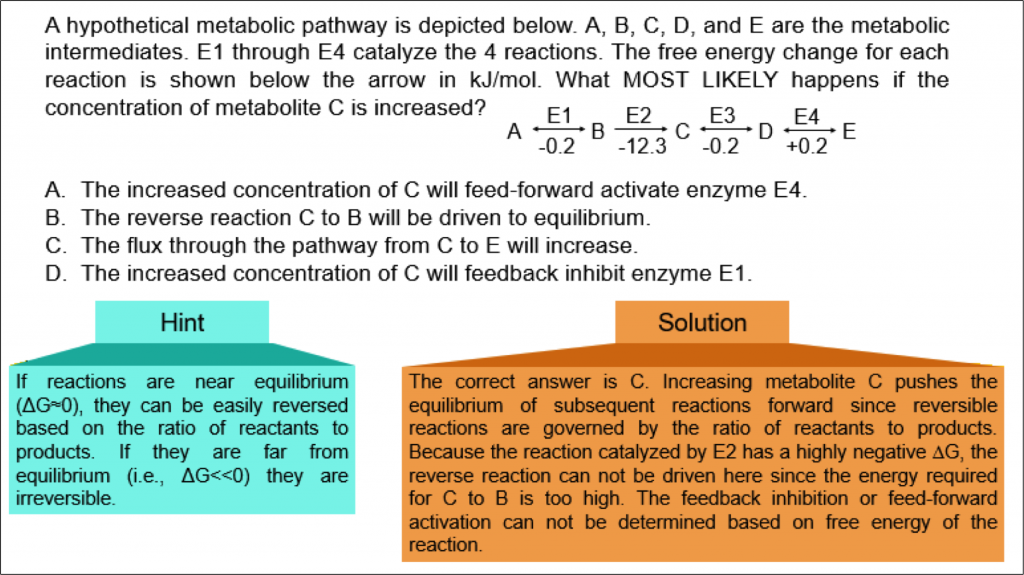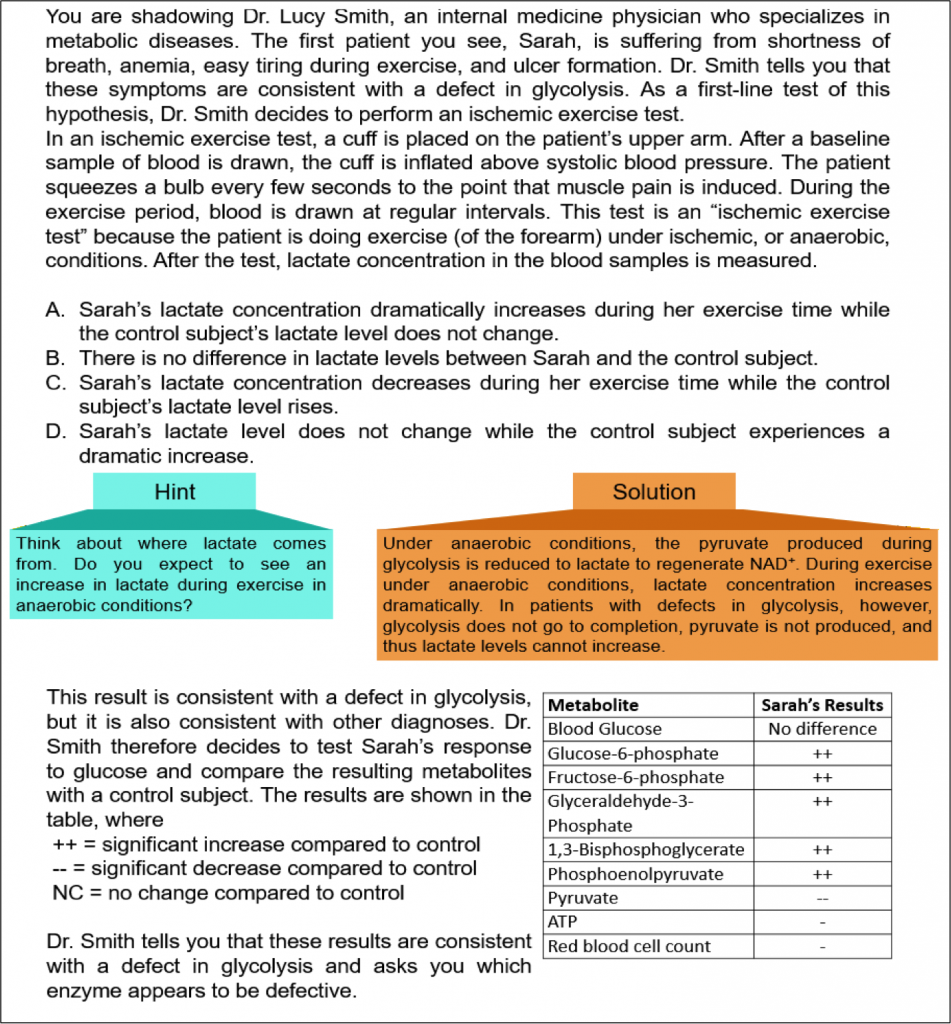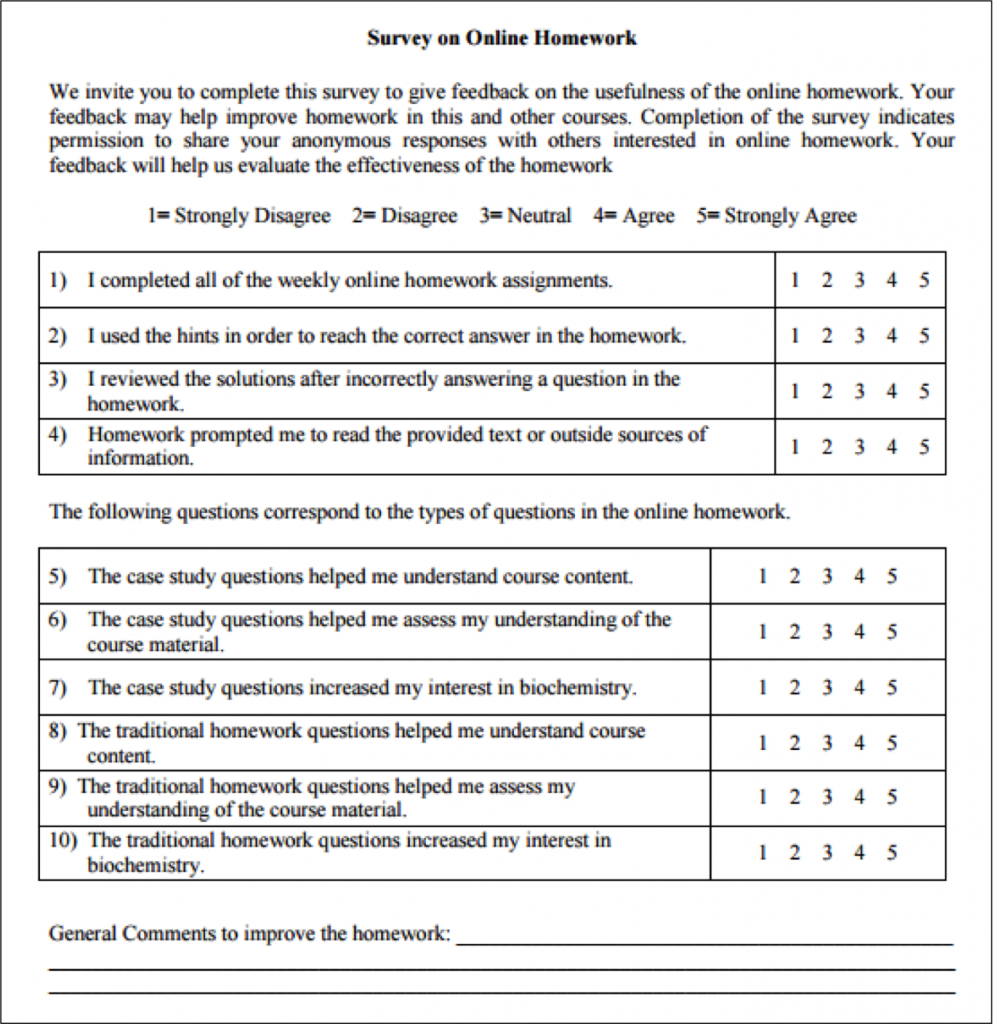Biochemistry BSCI2520
L to R: Kristin Droege, Chemistry, working with Cynthia Brame, Senior Lecturer in Biological Sciences; Brandt Eichman, Associate Professor of Biological Sciences; Lauren Jackson, Assistant Professor of Biological Sciences; and Charles Singleton, Professor of Biological Sciences
Problem
Undergraduate introductory science courses are often large classes that mainly utilize lecture as a teaching method. Students often rely on rote memorization or shallow learning methods to manage course material. Increasing student engagement should increase student learning.1
Potential Solution
Online homework is a commonly employed method to increase student participation and encourage students to practice the type of thinking needed for the course. This method has been used in introductory science classes and shown to increase student test scores and retention of information.2
Rationale
When online homework has automatic feedback with multiple attempts to answer it provides many of the same benefits as group work.3 Online homework is very useful in increasing student engagement but the format of the online homework in introductory biochemistry courses has not been investigated. Therefore we will investigate if a traditional homework format or a case study format is more effective online homework1. Which type of homework questions will help students achieve topic-level learning objectives?
Research Questions
- Will the homework help students achieve topic-level learning objectives?
Hypothesis: Homework will improve student’s ability to achieve topic-level learning objectives compared to previous year. There will be no difference in the effectiveness of the two formats.
- Which type of homework format is more effective at helping students evaluate their own learning?
Hypothesis: The two homework formats will be equally effective at helping students assess their understanding of biochemistry concepts.
- Which type of homework question is more effective at stimulating student interest in biochemistry?
Hypothesis: Case study questions will increase students’ interest in biochemistry more than traditional homework.
Method
Online homework will be implemented in a biochemistry course in Fall 2016, with a total of approximately 250 students in two sections of the course. Six homework assignments, consisting of 10 questions each, will be used to test our hypotheses. In these six homework assignments, one biochemistry topic will be covered by five “traditional” homework questions derived from the textbook while a second topic will be covered by five case study-associated questions. Examples are shown below.
Traditional Homework Questions
Case Study-Associated Questions
To evaluate the relative effectiveness of the two types of homework questions at helping students achieve topic-level learning objectives, we will compare performance on final exam questions, using student performance from previous years as a control. For example, the glycolytic metabolic pathway will be associated with traditional homework questions, while the gluconeogenic pathway will be associated with case study homework questions. We will compare student performance on final exam questions related to glycolysis and gluconeogenesis, using answers from the previous year as a control, to determine whether one type of homework question was more effective at helping students learn the material.
To evaluate the relative effectiveness of the two types of homework questions at helping students assess their own understanding, we will invite students to complete an anonymous survey at the end of the course reporting their perception of the utility of each type of homework for promoting their learning and for helping students evaluate their own understanding. The survey will also collect data on whether either question type increases student interest.
This study has the potential to improve understanding of the types of online homework questions that promote student understanding of biochemistry, a key course in preparation for careers in biology and medicine.
Results
Research Question 1: Will the homework help students achieve topic-level learning objectives?
We compared student performance on several questions that were identical on the 2015 and 2016 final exams and that dealt with topics covered by online homework. (Table 1) We observed a net gain of 4.04 points. Student t-test (2 tailed, unequal variance) was used to calculate a p value of 0.032 indicating a small but significant gain in these topics.
Table 1. Total scores for identical, homework related questions on final exam. N= 136 (p= 0.032)

To identify whether one type of homework was more effective at helping students achieve topic-level learning objectives, final exam questions that a) were addressed on the online homework and b) were identical in 2015 and 2016 were divided into two groups: questions for “traditional” topics and questions for “case-study” topics. The net gain from 2015 to 2016 for each type of question was calculated and tested for significance. For “traditional” topics there was a net gain of 1.87 points from 2015 to 2016 (45.02 to 46.89). Student t-test (2 tailed, unequal variance) was used to calculate a p value of 0.18 indicating this gain is not significant. The net gain for “case study” topics from 2015 to 2016 was 2.66 points (42.51 to 45.55) with a calculated p value of 0.0057 indicating a small but significant change. (Fig. 1)
Figure 1. Points total for questions from final exams. (N=136)

Research Question 2: Which type of homework format is more effective at helping students evaluate their own learning?
During the end of the year survey students were asked if they believed the provided homework helped them assess their understanding of the course material. Using the likert scale (with 1= strongly disagree to 5= strongly agree) there was a significant difference in student responses. The average response for traditional homework was 4.08 and case study homework was 4.33 with a calculated p = 0.04. (Fig. 2)
Figure 2. Student survey responses on homework’s ability to help assess their understanding. (N=86)
Research Question 3: Which type of homework question is more effective at stimulating student interest in biochemistry?
Students were asked to complete a survey to report their perceptions of the homework. This survey was divided into a “traditional” homework sections and a “case-study” sections. Each section was provided a Likert scale so students could state their level of agreement with the provided statements. The survey indicated that students found both types of online homework questions useful but found the case study homework significantly more beneficial. They also felt that the case study homework increased their interest in biochemistry and their ability to connect course information with everyday phenomena. (Table 2, Fig. 3 and 4)
Table 3. Averages responses for student survey. N= 86. Strongly agree=5, agree=4, neutral=3, disagree=2, and strongly disagree=1. * indicates p<0.05 and ** indicates p<0.01
Statement |
Traditional Average |
Case Study
|
Differences in Averages |
| The homework questions increased my interest in biochemistry. | 3.07 | 4.44 | 1.37** |
| The homework questions helped me see connections between biochemistry and everyday phenomena. | 3.09 | 4.64 | 1.55** |
Figure 3. Survey responses for increasing students interest in biochemistry (N=86)
Figure 4. Survey responses for helping students see connections between course material and everyday phenomena (N=86)
Conclusions
In this study we were able to determine that homework did improve student perform on the final exam (when questions that were kept identical from 2015 to 2016 were compared). We also saw that “case-study” questions created a small but significant increase in the point total for “case-study” topics on the final exams. Student surveys revealed that students believed the “case-study” homework were more effective at increasing their understanding and interest in course material. “Case-study” homework also significantly increased their ability to connect course material with real-world phenomena. Therefore, case-study homework appears to have more benefits when compared to traditional homework format in a biochemistry course.
References
- Botch, B.; Day, R.; Vining, W.; Steward, B. J. Chem. Educ. 2007, 84 (3), 547-553.
- Richard-Babb, M.; Drelick, J.; Henry, Z.; Robertson-Honecker, J. J. Coll. Sci. Teach. 2011, 40, 80-94.
- Eichler, J. F.; Peeples, J. J. Chem. Educ. 2013, 90, 1137-1143.






